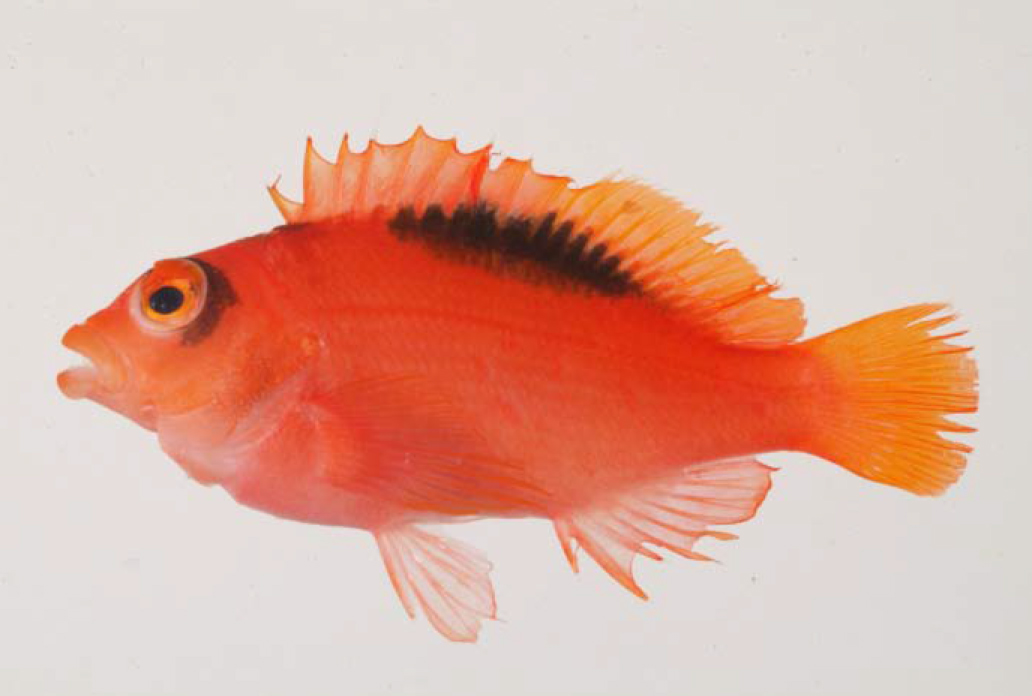Moorea: The Coral Reef Community
Neocirrhites armatus Fish
Moorea
From the researcher's perspective...
Look closely as you swim by the Pocillopora colonies—your eye is likely to catch a vision of a red sentinel perched among the branches of the colony. Most likely this is a hawkfish, one of two obligate species that live among Pocillopora colonies. These guys dart out and grab unsuspecting prey or flit about among the colony catching unwary creatures. They can brace themselves in among the branches with their thick pectoral rays so that even crashing waves have a hard time moving them. The two species commonly encountered in Moorea are the arc-eye and the flame hawkfish (shown, Neocirrhites armatus). The arc-eye usually is poised at the top of the colony whereas the flame hawkfish likes to dart among the branches.
The details of the relationships between the two hawkfish species and other members of their community are unknown. Do they have the same menu? If so many species in these coral heads are obligates, do the hawkfish cut the residents a break? Are they eating the guard crabs or other species that provide some benefit to the system, or do they avoid these species and concentrate efforts on the more transient species that are not part of the network of usual players? Examination of these types of ecologic interactions helps us to understand how reef diversity is built. The use of snippets of DNA from the guts of the two species of hawkfish allows us to determine exactly who they are eating. Turns out that the two hawkfish species each have a somewhat different diet—the larger arc-eye tends to feed on larger prey items, while the flame hawkfish eats smaller kinds of animals.
Chris Meyer, Seabird McKeon, Hannah Stewart, and Matthew Johnson
DNA Barcode of Neocirrhites armatus
Accessed from Barcode of Life Data Systems
MBFA008-07 | Neocirrhites armatus | COI-5P
CTTGGGCTGGAATAGTCGGCACAGCTCTTAGCTTGCTCATTCGGGCAGAACTTAGCCAACCTGGCGCCCTCCTTG GGGACGACCAGATCTATAATGTAATCGTTACAGCTCATGCTTTTGTAATGATTTTCTTTATAGTAATACCAATTA TGATTGGGGGCTTCGGGAATTGACTAATCCCCCTAATGATTGGAGCCCCTGACATGGCTTTCCCACGAATGAACA ACATAAGCTTCTGGCTACTTCCTCCTTCCTTCCTCCTCCTTCTAGCATCTTCCGGAGTTGAAGCTGGAGCAGGGA CTGGCTGAACTGTCTACCCACCCCTAGCCGGCAACCTAGCCCATGCGGGAGCATCCGTAGACTTAACTATTTTCT CGCTTCATCTAGCAGGAATTTCTTCCATCCTTGGGGCCATTAACTTTATTACAACTATTGTTAACATGAAGCCTC CTGCCATCTCCCAATACCAAACCCCTCTATTTGTGTGGGCCGTACTAATCACTGCAGTCCTTCTTCTTCTTTCCC TGCCTGTCCTTGCCGCTGGTATTACAATGCTCCTAACAGACCGAAACCTAAATACCACATTTTTCGACCCTGCAG GAGGAGGTGATCCTATTCT


